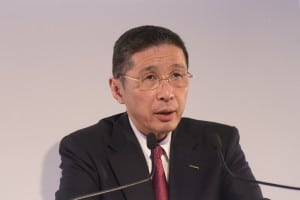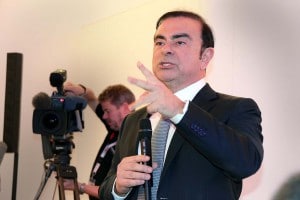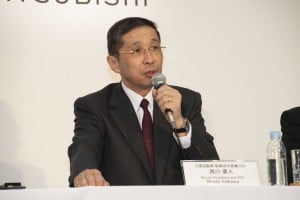
Nissan CEO Hiroto Saikawa said he will step down from his post on Sept. 16 after a tumultuous two-year run.
Barely a week after acknowledging he received more than $440,000 in excess pay, Nissan CEO Hiroto Saikawa said he will step down on Sept. 16, ending a rein marked by controversy and scandal, as well as declining global sales and earnings.
Saikawa will be replaced, at least temporarily, by Nissan Motor Co. Chief Operating Officer Yasuhiro Yamauchi, though the automaker’s board wants to find a permanent successor by the end of October.
The wrap-up of Saikawa’s two-year run as chief executive comes as the automaker struggles to deal with a variety of problems and, among other things, is moving to slash both global production capacity and its product line-up. But the biggest challenge for the CEO’s successor will be cleaning up the various scandals that came out into the open with the arrest of former Nissan Chairman Carlos Ghosn last November.
(Nissan CEO Admits to Getting Overpaid, Benefitted from Program that Led to Ouster of Ghosn)
Ghosn was yanked off his corporate jet shortly after landing at Tokyo’s Haneda Airport, along with top lieutenant Greg Kelly. Once hailed as the man who had led the turnaround of a near-bankrupt Nissan, Ghosn was subsequently accused of a variety of financial crimes, including the concealment of millions of dollars in income.
Ghosn’s arrest was triggered by an internal investigation ordered by Saikawa, a 42-year Nissan veteran. But the scandal wound up placing Saikawa in the hot seat, as well. He was quickly accused by some observers of leading a putsch aimed at not only crippling Ghosn, his one-time mentor, but also for allegedly using the scandal as a way to distance Nissan from its French alliance partner, Renault.
Even as additional criminal charges were levied against Ghosn during the following months, Saikawa pushed ahead with a probe aimed at revealing further corporate corruption. To critics, however, the move was seen as a further house-cleaning of Ghosn loyalists, as well as foreign executives. Jose Munoz, the company’s chief performance officer, was among those who left voluntarily or were forced out. And, just last month, Karim Habib, the well-regarded design chief at luxury subsidiary Infiniti, also tendered his resignation.
The still ongoing corruption probe turned out snaring the very man who ordered it in the first place. Just last week, it was revealed that Saikawa was among a number of senior Nissan executives who had received excess pay, ostensibly the result of an equity remuneration scheme run by Nissan that, Saikawa quickly claimed, was “created under the leadership of (Carlos) Ghosn.”
Saikawa insisted he was not aware of the problem, telling reporters, “I thought the procedures were handled properly and I didn’t know.” He added that he planned to reimburse the company for his 47 million yen, or $443,000, in excess pay and expected others would do the same.
But the news raised new concerns about how so many financial irregularities had gone on for so long – and how they could have occurred without the knowledge of top managers, including the CEO.
“He might have been able to survive were it not for all the other problems Nissan has been having,” a source close to the company told TheDetroitBureau.com.
The automaker suffered a sharp downturn during the fiscal year that ended March 31, global sales dipping 4.3%, to 5.22 million vehicles, while earnings were off 57%, to 319.1 billion yen, or $2.9 billion.
And the new fiscal year – which continues through March 31, 2020, got off to an even worse start. Analysts expected Nissan to deliver earnings of about $1.6 billion for the April-June quarter. Instead, the numbers came in at a meager $59 million, or 6.4 billion yen, down from 115.8 billion yen during the first fiscal quarter of 2018.
The automaker has launched a downsizing program that will not only see it trim its model count and production capacity by 10% during the next three years, but also reduce its global workforce by 12,500.
Saikawa had actually announced plans to retire last January, just days after the U.S. Securities and Exchange Commission announced it would open a probe into the Ghosn scandal and related financial abuses. But, at the time, the CEO did not set a clear target for when he would leave.
(Nissan Job Cuts Go Deeper Than Expected)
The short departure notice announced on Monday came shortly after Saikawa met with members of the Nissan board at the company’s headquarters in Yokohama.



Does this qualify as a suicide?